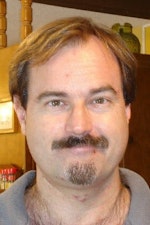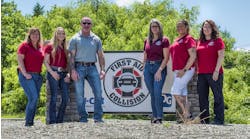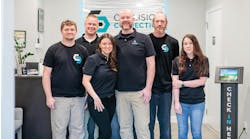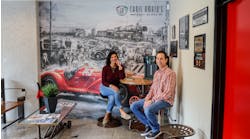While there might not be a direct correlation between a business’s altruism and profit, a vigorous relationship with its community and environment can lead to a healthier shop. As the journal Psychology Today puts it, “most of us realize that when we make the effort to give without expectations of reciprocity, we feel fulfilled and energized.”
No doubt this can work on a company level too, as firms reach out to improve the world beyond their four walls. It can be as simple as cooperating with local initiatives, or perhaps investing in energy-saving technology which helps the environment; providing assistance to the needy, or even relief missions to other countries. Each method seeks to offset circumstance with endeavor, to operate an ecologically and ethically sustainable business in the community at large.
Of course ecological concerns are more prevalent out West, particularly during periods of drought. Situated in the heart of Seattle, WA, the grounds of David Winters’ Swedish Automotive is certified as a wildlife habitat. “We have a lot of birds and squirrels who are quite happy here,” boasts Winters.
For a piece of property to qualify, basic requirements include having sources of food and water and a place for wildlife to raise their young. “Some of the plantings were here when we moved in,” Winters states. “We have some nice berries—the birds like those—and we put in four birdhouses about two years ago that’ve hatched about half a dozen sets of chicks.
“Most of our landscaping and plantings are green—we don’t use any chemicals,” he continues. “Most are also drought resistant, but we are still watering about three days a week until the trees get really established.”
George’s Sierra Shell in Fontana, CA recently removed all of their grasslands and replaced them with rock garden landscaping through the state’s Be Water Wise program. A $12,000 incentive helped motivate owner Doug Whiteman initially, but he reports their water bill dropped from $350 a month to $70.
Whiteman went ahead and installed solar panels, as did Bill Coniom of 25 Street Automotive in Phoenix, AZ, even though his state is more concerned with conserving water. “(My) solar doesn’t really pay for itself because I don’t have a lot of roof space,” notes Coniom, “but it was the right thing to do. Whether you believe in global warming or not, you have to believe that humans are the custodians of this planet. We really need to do more than what’s required of us.”
Coniom also bought an aqueous parts cleaner, which has little or no evaporation and is far more environmentally friendly than chemical-based tanks, and has plans to further his own conservation program. “The local waste management people (limit) what we can recycle, so we find ourselves taking things home,” Coniom says. “The next thing on my agenda is to find ways to recycle more things more efficiently.”
Winters’ Swedish Auto is already there, recycling virtually everything from coolant, brake fluid, engine oil, tranny fluid, all of the metal that comes off the cars—even plastic bags. “We built a brand new shop in 2010, and it’s very efficient,” he asserts. “We structurally insulated panels and roof, so it’s super insulated. We have solar panels on the roof, so we produce about 12% of our energy. We have heated floors; basically we use waste oil to heat water which is pumped through the floor.”
Lake Arbor Auto’s Dana TePoel lent his emissions expertise to Colorado when the state kicked off a clean air program back in the 90s, but now advises against using recycled oil heaters for the same reason. “We used to burn our oil in heaters, but I questioned the validity of how that’s really recycling,” he explains. “Those things run terribly. The carbon monoxide that comes out of those heaters, you can’t manage it, it’s a primitive process. You’re better off having this stuff hauled to a place that makes recycled oil or asphalt.
“We don’t use any solvents anymore,” he adds. “I’ve replaced our solvent tank with two ‘smart washers.’ You have to plug them in, and there are enzymes that live within these tanks, and they feed off of the petroleum products.” Besides the machinery, TePoel also advocates healthier lifestyles with programs like Denver’s ‘Bike to Work Day.’
“We do that every year,” he reports. “Back when I started this I had just instituted a wellness program and actually received a grant of $500.” So he offered a challenge to his employees: between Bike to Work Day that year and the next, the person who logged the most miles riding their bike instead of driving a car got $250, second place $150, third $100.
“I gave double miles to people who would ride bikes to lunch,” he adds, “because when you drive a car just 10 blocks to a restaurant, shut it off, then restart it to drive 10 blocks back, the O2 sensor doesn’t get warm enough to let the computer controls go into a closed loop, which is less efficient with more emissions.”
From there, ToPoel’s efforts extend beyond the environment into the community itself, where he offers discount car diagnosis and repair for teen moms through a local charity, as well as inspecting proper installation of child safety seats. “When we discovered that more than 75% of child safety seats were installed incorrectly, we decided that Lake Arbor Auto had to contribute to some kind of resolution of this issue,” TePoel said in an online article by Steve Caulk.
One of only two shops in the North Denver area recognized via the National Child Passenger Safety Certification, ToPoel and two other employees offer free consultations at the shop; besides inspections, they can educate child caretakers on the correct use of seats, and check for degradation; should seats be out of date or damaged, Lake Arbor also undertakes shipping them to Boulder for recycling.
While many shops are involved in local, sometimes national charity work, Dave Denmon of Dave’s Car Care has gone global. Besides helping local homeless veterans get back on their feet, his Glendale, AZ shop is heavily invested in missionary work in Asia and Africa. Through his church, Denmon has helped established what are essentially micro business loan institutions for communities in Nepal and Ghana, respectively.
“It’s an earth-shattering experience when you sit with a man [in Nepal] to teach him to do a budget, and his whole monthly income is $50,” Denmon reports. “But it’s all relative to the economy; you teach a budgeting system. In Africa we were involved with a technical school that taught catering and sewing to prostitutes. A certificate of graduation from one of these schools allows you to be employed.”
And the benefits of such philathropy? “I think what it does for me as a business owner of 35 years,” says Denmon, “it’s a reflection of our appreciation for our clientele. We’re trying to make the community a better place to live in. We have a link on our website, and we’re known in the community; Dave’s doesn’t just take, Dave gives back.”
V&F Auto in Agawam, MA, helps a virtual laundry list of charities, like Paint the Town Purple (cancer research), Hoof for the Roof (housing for homeless veterans), Keep Education Rolling (money for school equipment) and the ALS ice bucket challenge (with a front loader no less).
“I just think that’s who we are,” muses V&F’s Nicole Palange. “My dad Frank is the owner and I’ve gotten involved as a third generation in the business, and it’s just something we enjoy doing. If you’re passionate about something, you’ll always be successful in finding ways to give to the community. The creativity just kind of flows when you decide who you want to touch, then you can reach out to different people you might know in the industry and say, ‘okay, this is what we can do.’ It’s definitely rewarding.”
“We’re a little family shop,” says Bill Coniom of 25th Street Auto. “We only have two full time technicians here, but we really do what we can. The Salvation Army was having trouble with a water drive, so I reached in the cash drawer and had our part time trade school helper buy some cases of water and take it to them. When things need to be done, we do them, because it’s our culture to do what’s right, whether it’s the people in the building or in the community.”
Of course there are always marketing opportunities: “Whenever we have a big event we put together a press release with a picture, and go through what we did and how it is helping the community,” notes Palange. “But we don’t do it for that reason; that’s just an extra bonus we get by participating in these things.”
Shops can develop their programs through established charities or religious institutions; some community events can even be organized through business networks. “(Car Quest’s Tech-Net) did a Family Service Day (FSD) in our community, and was successful,” reports Judi Haglin of Haglin Automotive, the 2016 Top Shop. The FSD’s ‘Keep Cars Kickin’ program offers “no-charge vehicle maintenance, service and education to families that need help caring for their automobiles,” according to their website.
“Five shops in the region participated, each one taking a different approach,” says Haglin. “We work with battered women—a cause dear to my heart—so we picked the Safe House Alliance as our partner. (FSD) was selling it as cause marketing, which brings cars into your bays, but there’s also just being good Samaritans in the community.”
Bottom line? Nothing spreads like good will; pay it forward.




